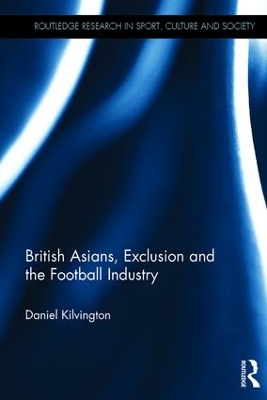Routledge Research in Sport, Culture and Society
2 total works
This book examines the exclusion of British Asians from the football industry, drawing on a wealth of empirical work with players, coaches, scouts, managers, fans, anti-racist organisations, community officers, and key stakeholders. It adopts a critical race theory (CRT) perspective to offer a platform for excluded communities to discuss their experiences and offer their advice, guidance and criticisms. Notions of whiteness, intersectionalities and gender are explored and filter throughout. This book highlights historical and contemporary reasons for the British Asian exclusion from football, critically examines a number of tried and tested inclusion strategies, and offers recommendations for reform to help achieve equality and inclusion. The research aims to:
- dehomogenise British Asian football experiences
- offer the counter-narratives of British Asian male and females to challenge master-narratives
- comprehend the importance of intersectionalities
- understand identity shifts and cultural changes
- challenge socio-cultural stereotypes and racial myths
- highlight contemporary manifestations of racisms in football at all levels
- examine the role 'parallel football' environments have played in the exclusion
- cast a critical eye over inclusion initiatives
- promote recommendations for reform which are born out of empirical research
As long as marginalized groups, such as British Asians, are excluded from a field of popular culture, in this case football, it is a topic that demands attention, deserves investigation and requires solutions. It is hoped that this book can be of use to students, researchers and policymakers who share an active interest in football, exclusion and equality.
Sport, Racism and Social Media
by Neil Farrington, Lee Hall, Daniel Kilvington, John Price, and Amir Saeed
Racist abuse may at one time have been hurled across the sports stadium or scrawled on a wall. But in today's social media world it can be published to millions, from almost anywhere, in an instant.
Sport, Racism and Social Media provides the first significant, academic account of how social media is shaping the nature of racisms in sport. Among the questions it addresses are:
- How, and why, is racism being expressed across different social media platforms and sporting contexts?
-
- To what extent is social media providing new platforms for traditional prejudices or actually creating new forms of racism?
-
- How can campaigners, authorities and individuals best challenge and counter these forms of racism?
Combining analysis of social media content with in-depth interviews with athletes, fans, campaigners and officials, and including extensive case studies of soccer, boxing, the NHL, the NBA, and cricket, the book provides important new insights on a familiar but ever changing story. It is essential reading for any student, researcher, media professional, administrator or policy-maker with an interest in sport, new media or the issue of racism in wider society.

